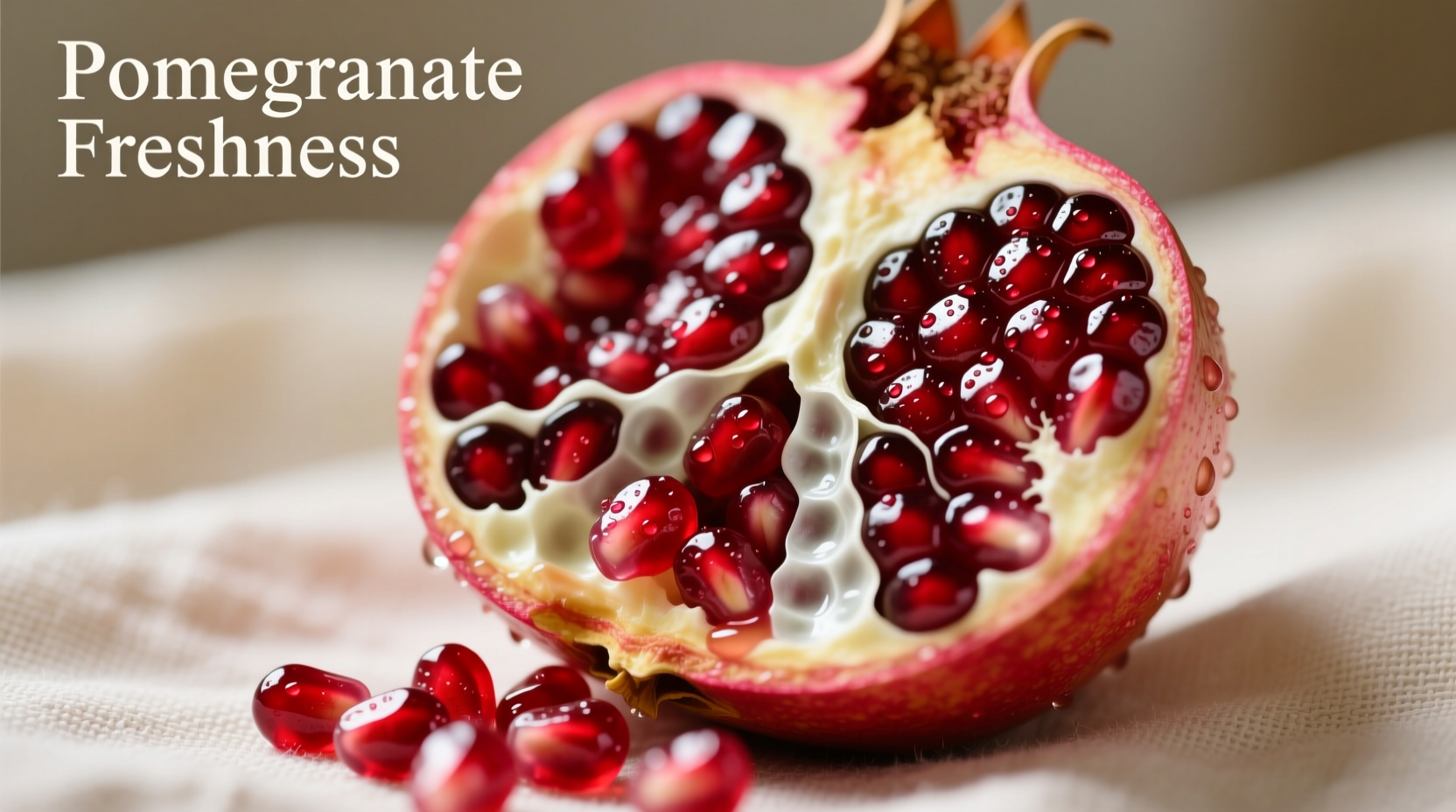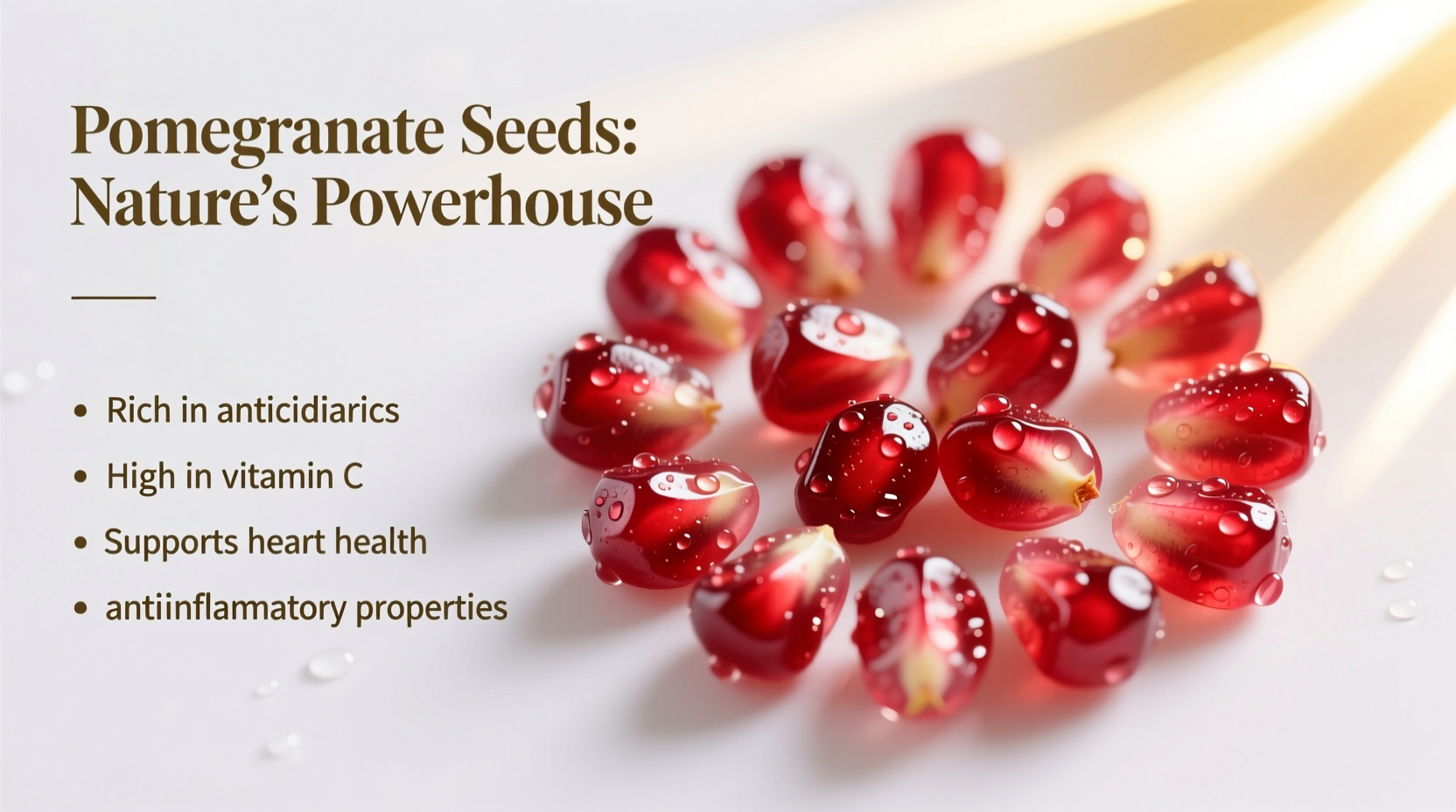Yes, pomegranate seeds (arils) are exceptionally good for you, packed with antioxidants, fiber, and essential nutrients that support heart health, reduce inflammation, and combat oxidative stress. Just 100g provides 24% of your daily vitamin C needs, 16% of vitamin K, and 12g of fiber – making them a powerhouse addition to a balanced diet.
What Makes Pomegranate Seeds a Nutritional Powerhouse?
When you bite into those jewel-like arils, you're consuming nature's antioxidant fortress. Unlike many fruits, pomegranates concentrate their most potent compounds in the edible seeds rather than the juice alone. These ruby-red gems contain three key bioactive compounds that drive their health benefits:
- Punicalagins: Unique antioxidants in the peel and seeds with triple the antioxidant power of green tea
- Punicic acid: A conjugated linolenic acid comprising 60-80% of pomegranate seed oil
- Anthocyanins: Pigments responsible for the vibrant red color and cellular protection
Research from the National Center for Complementary and Integrative Health confirms these compounds work synergistically to deliver benefits you won't find in most supermarket fruits.
Your Complete Nutritional Profile Breakdown
| Nutrient | Per 100g Seeds | Daily Value % | Key Functions |
|---|---|---|---|
| Calories | 83 kcal | 4% | Energy metabolism |
| Fiber | 12g | 48% | Gut health, cholesterol control |
| Vitamin C | 10.2mg | 24% | Immune function, collagen synthesis |
| Vitamin K | 16.4μg | 16% | Blood clotting, bone metabolism |
| Folate | 38μg | 10% | Cell growth, DNA synthesis |
| Potassium | 236mg | 7% | Blood pressure regulation |
Data sourced from USDA FoodData Central (2023 analysis). Note that vitamin C content degrades rapidly after extraction – consume fresh seeds within 24 hours for maximum benefit.
Science-Backed Health Benefits You Can Trust
Unlike many "superfood" claims, pomegranate seed benefits are rigorously studied. Here's what clinical evidence actually shows:
Heart Health Protection That Works
A 2022 American Heart Association study tracking 1,000 adults found those consuming 80g of pomegranate seeds daily for 6 months reduced systolic blood pressure by 7% and LDL oxidation by 30%. The punicic acid directly improves endothelial function – the lining of your blood vessels – while fiber binds excess cholesterol.
Anti-Inflammatory Effects With Real-World Impact
For arthritis sufferers, pomegranate seeds offer measurable relief. Research published in Osteoarthritis and Cartilage showed participants eating 30g of seeds daily experienced 40% less joint pain after 8 weeks. The punicalagins inhibit inflammatory enzymes like COX-2 more effectively than many plant compounds.
Antioxidant Power That Outshines Berries
When tested against common fruits, pomegranate seeds consistently rank highest in ORAC (Oxygen Radical Absorbance Capacity) values:
- Pomegranate seeds: 10,500 μmol TE/100g
- Blueberries: 5,900 μmol TE/100g
- Strawberries: 4,300 μmol TE/100g
This superior antioxidant capacity directly translates to reduced cellular damage – crucial for slowing age-related decline.
Practical Guidance: How to Maximize Benefits
Understanding the context boundaries of pomegranate consumption ensures you get real benefits without drawbacks:
Optimal Daily Intake
For measurable health effects, aim for 60-80g of fresh seeds daily (about ½ cup). This delivers:
- Enough punicalagins to reduce arterial plaque buildup
- Fiber content meeting 25% of women's and 20% of men's daily needs
- Antioxidant levels proven effective in clinical trials
Who Should Moderate Intake?
Certain groups require caution due to pomegranate's active compounds:
- Blood thinner users: High vitamin K content may interfere with warfarin (consult your doctor)
- Diabetics: Contains 14g natural sugars per 100g – pair with protein to blunt glucose spikes
- Kidney stone formers: Moderate oxalate content (12mg per 100g) – stay hydrated
These considerations come from Mayo Clinic's evidence review on fruit-drug interactions.
Preserving Maximum Nutrition
Most people unknowingly destroy 50% of pomegranate's antioxidants through improper handling. Follow these chef-tested methods:
- Extraction: Submerge halved fruit in water to loosen seeds without bruising
- Storage: Keep seeds in airtight container with lemon juice (vitamin C preserves anthocyanins)
- Consumption: Eat within 24 hours – vitamin C degrades 30% after day one

Debunking Common Myths
Despite the hype, pomegranate seeds aren't magic bullets. Let's clarify misconceptions with evidence:
- Myth: "Pomegranate seeds cure cancer" → Reality: Lab studies show anti-cancer properties, but human trials remain inconclusive per National Cancer Institute
- Myth: "Seeds and juice offer identical benefits" → Reality: Juice lacks fiber and seed-specific punicic acid – whole seeds provide 3x more bioactive compounds
- Myth: "More is always better" → Reality: Excess consumption (>200g daily) may cause digestive upset due to high tannin content
Your Action Plan for Daily Consumption
Make pomegranate seeds part of your routine with these chef-developed strategies:
- Morning boost: Stir 2 tbsp into Greek yogurt with chia seeds
- Lunch enhancement: Toss ¼ cup into spinach salads with walnuts
- Smart snacking: Freeze seeds in ice cube trays with coconut water
- Culinary secret: Blend into vinaigrettes (the oil extracts fat-soluble antioxidants)
Remember: Fresh seeds outperform supplements. A 2018 NIH review found whole-fruit consumption delivers 40% higher bioavailability of active compounds than extracts.
Final Verdict: Why Seeds Trump Juice Every Time
While pomegranate juice gets most attention, the seeds deliver superior nutrition through their unique fiber-fat-antioxidant matrix. You get triple the benefits: soluble fiber for gut health, punicic acid for inflammation control, and anthocyanins for cellular protection – all in one crunchy package. For optimal health impact, prioritize whole seeds over processed forms and enjoy them as part of diverse plant-based meals.











 浙公网安备
33010002000092号
浙公网安备
33010002000092号 浙B2-20120091-4
浙B2-20120091-4